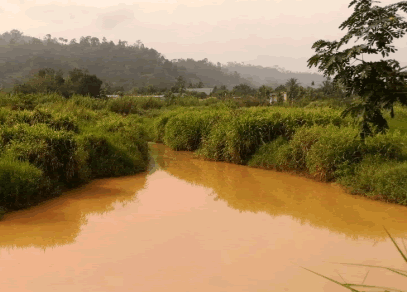AfriWater calls for legislative backing to Buffer Zone Policy
 Afriwater Community of Practice (Afri Water Cop – Ghana) has called for a legislative backing to enforce the Buffer Zone Policy in the wake of the mass destruction of water bodies by Galamsey and other extractive activities.
Afriwater Community of Practice (Afri Water Cop – Ghana) has called for a legislative backing to enforce the Buffer Zone Policy in the wake of the mass destruction of water bodies by Galamsey and other extractive activities.
The Buffer Zone Policy sets the procedures for managing and controlling activities such as agriculture, mining and inappropriate disposal of waste along water bodies’ banks and catchments, which affect water quality.
A statement issued by OilWatch Ghana, on behalf of AfriWater Cop, and copied to the Ghana News Agency, said this was a key step to ensuring a lasting water security and complement existing efforts being put in place to protect the environment.
“Consistent with the SDGs, Ghana has in place a Buffer Zone Policy. Embedded in this policy is the protection, regeneration, and maintenance or establishment of riparian buffer zones with the goal of improving water quality and quantity,” it said.
The statement, which was signed by Mr Noble Wadzah, the Coordinator of Oilwatch, said though Ghana had the policy in place its implementation had been the problem.
“Today to ask whether we have a buffer policy is probably to ask the question in a wrong way but the extent to which we have implemented this important policy if it has ever hit the implementation rail at all,” it said.
The statement said in the light of the Galamsey question, the issue of water should be considered in realm of physical and non-physical.
“Recent study outcome commissioned by the Africa Commission on Human and People’s Right and International Working Group for Indigenous Affairs (IWGIA) gives additional impetus to the cause Ghana has chosen to reverse the growing negative trend imposed by mining,” the statement said.
“The study brings into fore realities from Kenya, Cameroon, Uganda and Namibia, sheds light on the consequences of extractive industries on land rights and indigenous peoples in Africa and concluded among others that the situation is so worrying that so little is done to protect the environment….,” it said.
The statement said there was a striking relationship between the Africa Commission’s notes and the situation in Ghana with concerns of the damaging consequences of extractives on land and water, the statement said.
It said in Ghana the implication of illegal mining activities (galamsey) on land could not be discussed in isolation of the general extractive sector and the land question in which water formed a component.
“Recent survey conducted by Oilwatch Ghana does not only highlight oil as a new candidate factor behind land grab in Ghana but corroborates earlier similar studies and observations suggesting a growing tendency of land grab menace inspired by oil find beginning from the Western Region.
“More worrying is that the Western Region experience seem to be making some waves into potential oil areas of the Keta and the Voltain basins where land rush is being noted.
“Communities have signalled their resentment over the implication of this growing phenomenon on food and livelihoods security, describing the situation as appropriation of agriculture productive lands to service private profit interest goals expected from potential oil economy,” the statement said.
It said water played a crucial role in ecosystems function and service provision and, therefore, occupied an important space in the definition of International Public Goods also called Global Public Goods (IPGs).
For this reason, water had become an increasingly important part of not only international policy making processes but also in development planning, the statement said.
Given many threats posed to water resources, Ghana was benefiting from the ‘Shared Resources, Joint Solutions’ (SRJS) programme with support from the Netherlands Government, it said.
The statement said the programme, being implemented by ARocha Ghana and The Development Institute, is focused on safeguarding the ecosystem-based IPGs: water provision, food security, biodiversity conservation and climate resilience.
It said the SRJS programme sought to work towards sustainable management of landscapes that provided the most essential ecosystem services on which local communities and the broader economic development hinged.
Besides Ghana the SRJS programme was also benefiting other 16 low and lower middle-income countries of the world, the statement said.
“On behalf of AfriWater Cop-Ghana, Noble Wadzah of Oilwatch-Ghana expresses the hope that the momentum that has been sparked to stem the tide of the ravaging galamsey should be spiced up with additional policy and legislative mandates offered by the Buffer Zone Policy,” it said
Source: GNA
